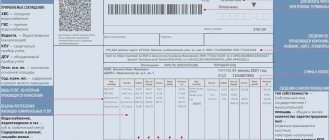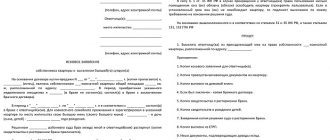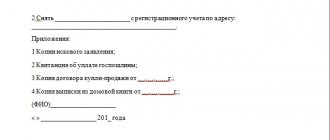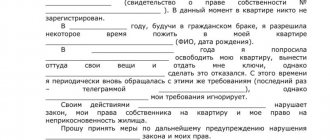Is it possible to evict a tenant if he is registered?
It is possible to evict a registered person who does not have ownership rights to the housing or its share, if there are grounds for this provided by law.
If a tenant refuses to deregister and move out, he can be discharged from the apartment only through the court. Both the owner and non-owner can initiate eviction if a person is simply registered.
To the owner
https://www.youtube.com/watch?v=https:accounts.google.comServiceLogin
If the living space is private property, only the owner can legally expel the residents (Article 35 of the Housing Code of the Russian Federation). A lawsuit from another person will simply not be accepted.
Not the owner
If the defendant occupies municipal or service housing, the employer, in addition to the municipality, can evict him (Articles 84, 85, 103 of the Housing Code of the Russian Federation). In certain situations, the initiator of the procedure may also be the prosecutor's office (Article 45 of the Civil Procedure Code of the Russian Federation), the Management Company (Article 293 of the Civil Code of the Russian Federation) or a meeting of residents (neighbors) whose rights are systematically violated.
To evict a tenant or former family member, the owner must follow the established procedure (is it possible to evict a former and current spouse or cohabitants?).
First of all, the copyright holder is obliged to notify the citizen of the need to check out of the living space due to the loss of the right to live there - divorce, expiration of the contract, etc.
You can learn about the differences between a warning, a notice and a demand to evict an apartment, as well as see sample documents in this article.
If voluntary deregistration and vacation of the living space does not occur after such a warning, the owner of the property files a claim in court. As necessary documents when filing a claim, the owner will need:
- passport;
- ownership documents;
- extract from the house register;
- evidence of the impossibility or undesirability of the defendant’s further residence in the disputed territory;
- correspondence with the tenant (notice of eviction and reaction to it);
- receipt of payment of state duty.
If the court upheld the claim, immediately after the decision enters into legal force and receives the relevant document, the plaintiff can appear at the Main Department of Migration Department with an application to deregister the evicted tenant. After a person is deregistered, he is required to leave the occupied living space. Otherwise, the bailiffs will deal with his eviction.
It is difficult to deprive minor children of registration and evict them when their parents’ marital status changes. Until they reach the age of eighteen, they may have the right to reside at the place of their registration with the parent-owner.
Conditions
In order to evict a registered person from an apartment that does not belong to him by right of ownership, the following conditions must be met:
- loss of family membership;
- immoral behavior and antisocial lifestyle;
- violation of the rights of third parties (neighbors);
- actual long-term residence in another place;
- non-payment of utility bills for more than 6 months;
- debt on a mortgage loan (for an apartment from which one is being evicted);
- expiration of the lease agreement;
- when the owner of the property changes;
- other conditions provided for by law.
Example. After marriage with Zvorykina T.N. Smirnov A.D. He registered her in his apartment, and they lived together for three years. The couple then decided that married life was no longer possible and divorced. Smirnov A.D. demanded that his ex-wife leave the apartment, but she did not agree. The ex-husband was forced to go to court with a claim to recognize Zvorykina as having lost the right to use the apartment. The court considered Smirnov’s arguments, as well as the documents he provided, including the divorce certificate, and satisfied his demands in full. Zvorykina was forced to deregister and move out of the apartment.
Reasons
A person registered therein who is not the owner may demand the vacancy of a residential premises for the following reasons:
- the defendant is not a member of the owner’s family or has lost family status (for example, as a result of divorce, deprivation of parental rights);
- a registered citizen has not lived in the disputed territory for a long time (testimony of neighbors, a certificate from the place of work or from the Management Company confirming the defendant’s residence in another place can become evidence, but if this cannot be proven, such an argument will not be accepted for consideration court);
- a change of owner is planned or has taken place (sale, donation, re-registration of housing);
- contractual terms have come to an end (hiring agreements and other temporary contracts, including labor contracts with the provision of housing);
- the tenant commits illegal actions (systematically does not pay bills, destroys the premises or uses it for other purposes, infringes on the rights of neighbors, etc.);
- the building has been transferred to the state or church, has been declared unfit for habitation, has been destroyed, is subject to demolition or conversion to non-residential use.
Stage No. 2 - Go to court
- Submit a statement of claim and other documents to the court.
I remind you once again that only one of the owners can submit an application and participate in the trial, but not all of them have to. Whoever appears in the statement of claim as a plaintiff is the one who files. The claim can also be filed by a hired lawyer/lawyer under a power of attorney.In practice, the trial lasts from 2.5 to 5 months. The law specifies a maximum of 2 months - clause 1 of Art. 154 Code of Civil Procedure of the Russian Federation.
You need to go to court at the location of the apartment - Art. 24 and art. 28 Code of Civil Procedure of the Russian Federation. In large cities these are district courts, in small towns and villages - city courts.
If one of the plaintiff owners is under 14 years old, he does not need to come to court. Instead, there must be one of the parents/guardians - Art. 28 Civil Code of the Russian Federation. If he is from 14 to 18 years old, he must also be present together with one of the parents/guardians - Art. 26 Civil Code of the Russian Federation.
First, you need to get the court details from the court office to pay the state fee. Usually they are at the information stand. Nowadays they rarely give you a receipt. The state duty is 300 rubles (clause 3, clause 1, article 333.19 of the Tax Code of the Russian Federation). It is better to pay it at some bank so that they issue a check in return.
After payment, submit originals and copies to the court reception/expedition office: 1. inventory and receipt for sending the eviction notice to the defendant (not always required) 2. prepared documents from the second stage; 3. inventories and receipts for sending documents to the defendant and a third party; 4. check for payment of state duty.
In the copy of the statement of claim, which will remain in the hands of the plaintiff, the court employee will put a stamp with the date of acceptance and the entry number.
Stamp samples
- The judge will review the application and set a date for a preliminary hearing.
Within 8 - 10 days from the date of filing the documents, the judge will consider the statement of claim and decide what to do with it next - accept, reject or leave without progress. Although according to the law it must be done within 5 working days - clause 1 of Art. 133 Code of Civil Procedure of the Russian Federation.If accepted, the judge will set a date for a preliminary hearing. It will arrive in approximately 15 to 35 days, depending on the judge’s workload. The court will send notices by registered mail to plaintiffs, defendants and third parties about the time and place of the preliminary hearing - clause 2 of Art. 113 Code of Civil Procedure of the Russian Federation.
I do not advise you to wait to receive the summons, but a week after filing the claim, check with the appointed judge about the date of the preliminary hearing. Typically, every judge has Mondays and Thursdays as days for receiving citizens. The name of the judge can be asked in the office/expedition.
Any questions? Consult a lawyer for free. Ask questions in the online consultant window at the bottom right of the screen, in the comments or by phone (24 hours a day, 7 days a week): 8 Moscow and region; 8 St. Petersburg and region; all regions of the Russian Federation.
- Conducting a preliminary meeting.
The preliminary hearing is preparation for the trial - Art. 152 Code of Civil Procedure of the Russian Federation. In it, the judge listens to the parties' demands and reviews the submitted documents. If there are not enough documents, the judge will indicate which ones need to be submitted.After this, a court date will be set. It will be held 15 - 35 days after the preliminary one. The defendant and third parties are again sent subpoenas, but this time for a court hearing.
- Conducting a court hearing.
At the beginning of the court hearing, the judge will announce the requirements for the claim. Then he will listen to each side, their additions, and ask clarifying questions.What should plaintiffs do? It is necessary to inform that their rights to use the apartment are violated by the defendant’s registration. I described above which articles to rely on. It all depends on who needs to be discharged.
There may be several court hearings. By law, the defendant must be notified twice. Therefore, if he does not come to the first meeting, a second one will be scheduled. It will be 10 - 30 days after the first one. If he doesn’t come to the second meeting, the judge will consider the case without his participation - Art. 167 and art. 233 Code of Civil Procedure of the Russian Federation.
- The court's decision is announced.
After the judge considers all the demands and arguments of the parties, he will make and announce his decision - Art. 193 Code of Civil Procedure of the Russian Federation. If the defendant was present at the court hearings, the decision will be in person. If you were not present, either in person or in absentia. This is for the judge's consideration. - Pick up a copy of the court decision in final form from the court office. You can find out about its readiness by calling the office. The court will send a copy of the decision to the defendant by registered mail to the address from which it was written.
Who should not be kicked out and what to do in this case?
The law cannot refuse the owner to remove persons who are not related to him from his living space.
https://www.youtube.com/watch?v=ytpressru
But if the defendant convinces the judge that he has nowhere to go, he will be given a deferment to resolve the housing issue. The duration of the deferment depends on the circumstances of a particular case and can range from one month to one year, and sometimes more (read about what to do if you are evicted to the street from your only home and how to avoid this).
Obligations to provide alternative housing are provided for in situations where the state interferes with plans for a house, or when we are talking about social rent. In cases with private property, such a problem may arise in exceptional circumstances when the ex-spouse moves out together with the child, if the child’s place of residence is determined with a parent who does not have housing, when such a demand is made by the defendant.
The difficulty is that despite the establishment of parental responsibility for the upbringing and development of children in the Family Code (Articles 56, 63 of the RF IC), paragraph 4 of Art. 31 of the RF Housing Code provides for the possibility of evicting a child on a general basis upon loss of the right to use, and obliging the parent-owner to provide housing for former family members is extremely problematic.
Eviction without provision of other housing occurs in the following cases:
- deprivation of parental rights with a court ban on cohabitation of a citizen with a child;
- transfer of ownership to another person (family members of the previous owner lose the right to use - Article 292 of the Civil Code of the Russian Federation);
- systematic failure to pay utility bills (read more about whether you can be evicted from an apartment due to debt for housing and communal services, a mortgage and other loans, here);
- destruction of living quarters and creation of dangerous situations for other residents (you can find out how to evict neighbors who are disturbing your life here);
- illegal use of housing for commercial purposes.
In such cases, it will be necessary to find ways to reach a peaceful agreement and voluntarily vacate the housing by the person registered in it.
The protection of the rights and interests of residential premises owners is provided not only by the Housing Code, but also by the Civil Code of Russia.
If you are faced with a similar problem and cannot solve it peacefully, turning to the courts will be a reasonable and fair solution.
With the right approach to the case, careful preparation of documents and justification of the reasons for eviction, the court, as a rule, takes the position of the plaintiff, but to minimize the risks of failure, it is still worth enlisting the support of an experienced lawyer.
If you find an error, please highlight a piece of text and press Ctrl Enter.
Is it possible to evict an unregistered person from an apartment?
Eviction proceedings are among the most complex because civil rights are involved.
Often, after the end of a family relationship, a dilemma arises about how to evict an unregistered person from an apartment. Often, trials regarding the rights to use the housing of an unregistered person are very often heard in court. In such cases, eviction is carried out against citizens with the right to use living space without providing them with compensation or new living space. Only the owner of the property can go to court, even if he also does not have registration. The legal owner may also be left homeless but receive compensation in situations where:










